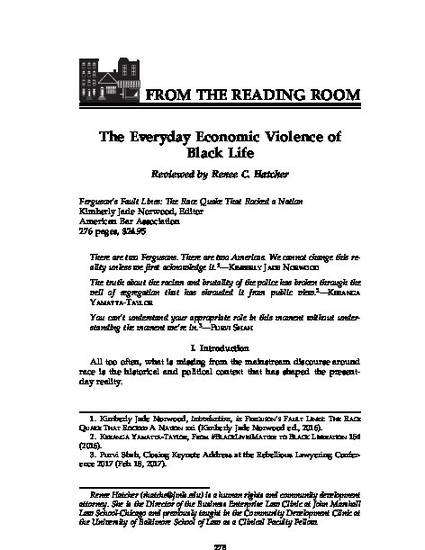
Article
The Everyday Economic Violence of Black Life
ABA Journal of Affordable Housing & Community Development Law
(2017)
Abstract
A review of Ferguson’s Fault Lines: The Race Quake That Rocked a Nation.
All too often, what is missing from the mainstream discourse around
race is the historical and political context that has shaped the present day
reality. Often there are conversations about the condition of Black neighborhoods,
without the mention of redlining; conversations about the poverty
rate in the Black community, without discussing the employment and
housing discrimination experienced by Black citizens. Most often, there
are conversations about Black criminality, without the mention of predatory
policing in low-income Black neighborhoods or the targeted enforcement
of petty crimes on Black citizens. Ferguson’s Fault Lines provides a
much needed social, political, and historical context to the national conversation
about racialized state violence reignited by the 2014 killing of
Michael Brown at the hands of Officer Darren Wilson. We may never definitively
know what happened on August 9, 2014,4 but we do know the
long history of discriminatory policies that shaped the conditions and policing
practices in Ferguson. Ferguson’s Fault Lines begins to unpack the
ways in which urban and more recently suburban landscapes have continuously
been racialized through decades of state de jure and de facto discrimination
and corresponding institutional policies. While there may
never be justice for Michael Brown, there can still be justice for the communities,
like Ferguson, that have suffered state-sanctioned structural and
spatial racism.
Kimberly Norwood has wonderfully curated thirteen chapters, each
written by a different scholar or advocate, that begin to shine a light on
why the slaying of Michael Brown at the hands of Officer Darren Wilson
sparked mass protests around the country and captured the nation’s attention.
While the killing of Michael Brown was the spark that ignited
the flame, the book examines the social conditions and economic and political
policies that served as tinder. Nearly half of the chapters paint a picture
of the historical and ever present state-sanctioned economic violence
on the Black community in Ferguson and greater St. Louis.
While the value of Ferguson’s Fault Lines is partly the nuanced historical
(policies) account of Ferguson and the St. Louis metropolitan area, there
are a number of parallels of state institutions and social forces that are relevant
for almost every city and suburb across the country. As a result,
Kimberly Norwood has provided a blueprint for the type of research
that is necessary to have fruitful public discourse and policy-making discussions
not only on local policing practices but also on housing, education,
and community development. The book marks a two-fold achievement
of connecting oppressive state-sanctioned policies to the current
conditions of Black communities, and it expands the call to transform
not only discriminatory policing practices but also those policies that contribute
to the everyday economic violence of Black life.
Keywords
- economic violence,
- Ferguson,
- community development,
- state-sanctioned violence,
- Black Lives Matter
Disciplines
Publication Date
Spring March 1, 2017
Citation Information
Renee Hatcher. "The Everyday Economic Violence of Black Life" ABA Journal of Affordable Housing & Community Development Law (2017) Available at: http://works.bepress.com/renee-hatcher/2/
